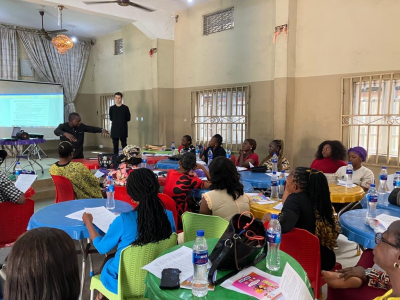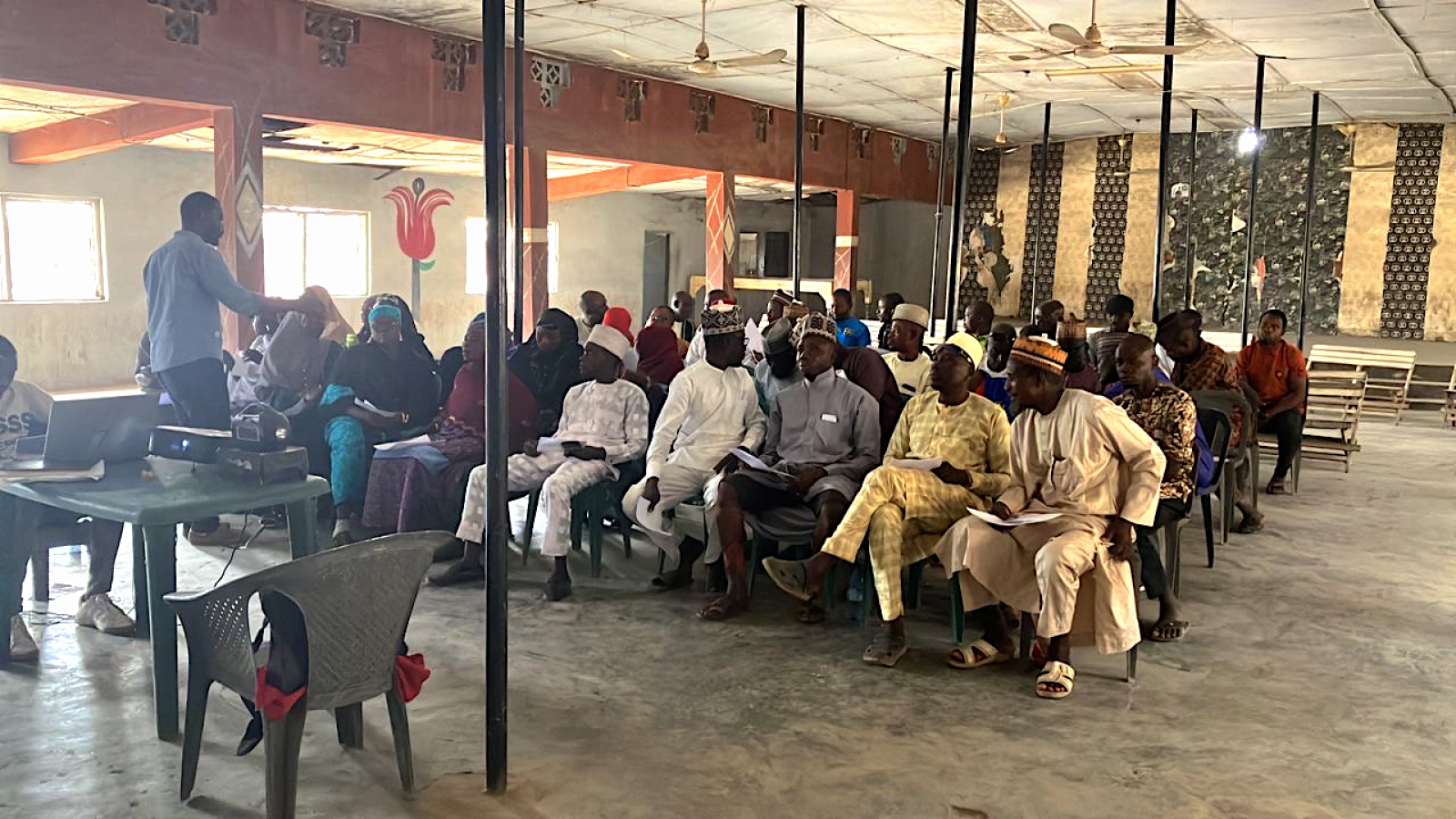Nigerian Deliberative Town Halls
Participants in the 2024 Deliberative Town Hall (DTH) in Nigeria.
In 2024, we worked in Nigeria, building on successes in Australia, the UK, and Chile, stretching the adaptability of our Deliberative Town Hall toolkit. IDEA Fellow, Marco Castradori, a PhD candidate at Princeton, who had lived in Nigeria and cultivated relationships with elected officials, proposed collaborating on the opportunity.
“It was an incredible new opportunity,” said Dr. Michael Neblo, IDEA's director. “IDEA had already expanded beyond the U.S., working in countries like Australia and the U.K., and even gaining valuable experience in Chile, a non-English speaking country in the global South. However, Nigeria presented a distinct set of challenges and opportunities. We needed to adapt our online town halls to a context with lower internet access and find ways to share background information in a country with widely varying literacy. However, the prospect of exploring how Deliberative Town Halls could function in a rapidly growing, diverse, and dynamic nation like Nigeria, which is poised to become the world's third most populous country by 2050, was both exciting and immensely rewarding. It was an unparalleled chance to strengthen democracy in such a critical context.”
IDEA collaborated closely to develop survey instruments for the experiment. Rather than text, we disseminated background materials through video to ensure that all citizens could access the necessary information before the event. Due to the limited and unreliable internet access, Marco and our partner in Nigeria, NOI Polls, established six in-person locations with internet connectivity. We linked these locations into a Zoom meeting with the participating Members of the National Assembly. In-person facilitators at these locations collected questions and comments from participants, transmitting them to the central moderation team.
In January 2024, we facilitated discussions between citizens in two districts, Bende and Baruten/Kaiama, and their respective representatives, Hon. Benjamin Kalu and Hon. Mohammed Omar Bio. The discussions focused on governance, with participants debating whether “small, incremental steps” or “radical reforms” would be the most effective approach. Citizens in both Bende and Baruten/Kaiama leaned toward gradual improvements, emphasizing the importance of consistent, small steps to fortify democracy.
Participants in Baruten/Kaiama leaned toward addressing national concerns, as illustrated by one participant’s remark: “This meeting exhibits unity; unity is imperative for our community, state, and Nigeria.” Participants in Bende echoed this sentiment, emphasizing national issues without neglecting local concerns.
Key Findings:

1. Increased Approval of Members: The DTHs boosted Hon. Kalu and Hon. Bio's approval ratings and re-election prospects, even positively influencing non-attendees. The events also enhanced constituents' perception of the representatives, associating them with positive traits and fewer negative characteristics.
2. Increase in Preference for Democratic Reform: After the DTH, there was an approximate 5% increase in prioritizing "making good laws for the whole country" among respondents in both regions, indicating a shift towards more national rather than parochial goals. There was also a 7% increase in preference for legislators to work for all Nigerians rather than just fight for their region.
3. Infrastructure Priorities: Healthcare and education were prioritized over roads and electricity, with specific projects like a diagnostics center in Bende and a University of Agriculture in Kaiama being preferred.
4. Diverse Demographic Participation: Both town halls successfully engaged a diverse, representative set of participants.
5. High Satisfaction with DTHs and Demand for More: Participants expressed high satisfaction with the experience and a strong desire for more DTHs, indicating willingness to engage in future events.
6. Strong Potential for for Spillover Effects: The positive impact on attendees and non-attendees suggests that DTHs could significantly enhance democratic engagement and strengthen connections between Nigerian citizens and their representatives.
"Quite simply, nothing like this has ever been done in Nigeria before," says Castradori. Many sub-Saharan African countries pursued democratic reforms in the 1990s, but progress soon stalled, leading observers to wonder whether African civil society could match the institutional changes. Many believe African citizens prefer personal and particularistic politics, or at least they cannot envision the alternative well enough to demand specific reforms. However, the results from these DTHs strongly suggest that it's not that Nigerians prefer clientelist politics but that their apparent support is a contingent, strategic response to constrained circumstances. Not only did participants in the DTHs move strongly towards support for democratic reform, but, according to post-survey data followed by interviews, even those who were not invited to the event but heard about it changed their opinions towards reform. In interviews after the DTH, one participant said, "This was the first time I've ever felt like a real citizen instead of a pauper going to see the big man." When interviewers asked participants if they thought this DTH would have any natural, meaningful effect, a few expressed doubts, leading another to reply, "Change has begun already. Since changes in [Nigerian democracy], no one has ever called a meeting like this. So, with this meeting, Change has already started. Now, change is for us to keep it going."
"What we may have uncovered here, and what we're testing next, is if these "spillover" effects are a sign of deep latent demand for democratic reform in this young and quickly growing democracy," Neblo says.
Castradori is currently drafting an article on this fieldwork along with IDEA Director of Research Dr. William Minozzi and Dr. Neblo.
Want to learn more about DTH findings? Read the reports below.

